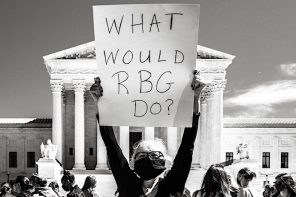I am a Christian pastor. My faith tells me that I must love my neighbor. Now, when Jesus gave this instruction, he might have been framing it in a new way, but the call to show love and respect to everyone we meet runs deeply throughout most faith traditions. Despite this common thread across religions, humans have struggled to put this into practice.
American history shows us as much.
America’s founders set into motion a great experiment. Decade by decade, new questions have arisen to test the theory that a government of the people, by the people and for the people can lead to life, liberty and happiness. In short, each generation has taken up the challenge of showing love to our neighbors through protecting life, expanding liberty and increasing happiness.
We celebrated the 50th anniversary of the Supreme Court’s decision in Griswold v. Connecticut earlier this year. That decision found embedded within our Constitution a fundamental right to privacy. Several years later, the court, drawing on the right to privacy, ruled in Roe v. Wade that a woman’s medical decisions are her own. The American experiment was tested and we rose, once again, to meet the challenge.
Despite this victory for freedom, many have fought against this liberty. Former Republican Rep. Henry Hyde was one such opponent.
Three years after Roe, Hyde proposed an amendment that would prevent Medicaid—our nation’s insurance for low-income people—from covering for abortion care. The Hyde amendment is a temporary rider to the budget that must be passed every year. We will mark the amendment’s 39th anniversary later this month.
Hyde could not attack the rights of rich and middle-class women, so he targeted poor women. “I certainly would like to prevent, if I could legally, anybody having an abortion: a rich woman, a middle-class woman or a poor woman,” he said at the time. “Unfortunately, the only vehicle available is the . . . Medicaid bill.”
However we feel about abortion, we can all agree that we should not withhold medical care just become someone is poor.
Decisions about how and under what circumstances to become a parent are sacred and personal. Women have abortions for many reasons. We have no way of fully understanding another’s decision because we do not stand in their shoes. These decisions are best made by a woman in consultation with her family and faith. Rather than shame and judgment, we should make sure that everyone has a safe and compassionate space when facing these important health and life decisions.
The Hyde amendment violates this sacred space for women who are enrolled in Medicaid insurance. That’s why we must repeal it.
Dozens of members of Congress introduced the Equal Access to Abortion Coverage in Health Insurance (EACH Woman) Act this summer. The EACH Woman Act would repeal the Hyde amendment and remove one of the major hurdles to economic and reproductive justice.
This law respects that each woman has the God-given ability to make her own decisions about pregnancy. God trusts and empowers each of us to make the best decisions that are best for our families and ourselves. The law would remove federal, state and local legislators’ ability to interfere with this by preventing them from outlawing abortion coverage through private insurance.
Removing the Hyde amendment and passing the EACH Woman Act are critical for advancing justice and liberty in America. We know, too, that there will still be work to do to ensure that each of us has the right to have children, to not have children if that’s what we decide, and to raise the children we have in healthy and supportive environments.
America is at its best when our laws match our compassion. We must show that the basic rights of life, liberty and the pursuit of happiness are not a luxury of the rich. All women, not just some, deserve the promises of America.
We must love our neighbor.



